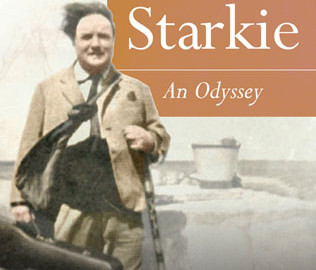Review: Walter Starkie, An Odyssey February 23, 2014
Author: Beach Combing | in : Contemporary, Modern , trackbackWalter Starkie is an in between figure. Born to the last of the Anglo-Irish in 1894, he added to his initial liminal state by: marrying an Italian (one of his better decisions); living abroad in Spain, Italy and the US; dividing loyalties between some of the twentieth-centuries less attractive regimes (Fascist Italy and Franco’s Spain) and Imperial Britain in decline; and then, occasionally, going off on gypsy expeditions through the most dangerous parts of Continental Europe with only his violin for company. Out of this life, that swung between the pedestrian and, out on the road, the tumltuous, he wrote a series of travelogues describing his adventures as a ‘gypsy scholar’ and also wrote some maudlin literary criticsm of, particularly, Spanish and Italian literature. My interest in Starkie is threefold: first, he was a member of the Fairy Investigation Society, possibly before the war, but certainly in the 1950s, which begs all kinds of questions not least ‘why!’; second, a dear old friend, in many ways a younger version of Starkie (now deceased), was taught Spanish by the great man at Trinity College Dublin; and, third, because in trying to find out information about Starkie in the last three or four years I have failed miserably and this has created a kind of yearning. Enter, then, from left stage, Jacqueline Hurtley, a long-standing resident of Catalonia who has ended my Starkie difficulties with a sledge-hammer of a volume on WS that takes us from his family before he was even conceived, to his wife’s death shortly after his in 1976. It gives every impression of being comprehensive from the seventeen page index, to the many pictures – some moving, some strange, some hilarious, to the vast bibliography and associated notes.
In trying to put together the biography of a first-rank famous man or woman you are spoilt for sources: with someone like Starkie though – he was never in the running for a Nobel Prize and never had Auden write a poem on his death – the sources are more obscure and more difficult to track down. Then, what is more challenging with Starkie, the sources are spread across several countries, some of which WS lived in for years, some of which he passed through as a fiddle-playing itinerant. The task of tracking down all of Starkie’s journalism, for example, in Ireland, his administrative activities at the British Consul in Madrid, his wild-catting in Hungary would require several languages and a lot of patience. Luckily, JH has proved herself more than up to the job. I am no wiser about Starkie and fairies, save some childhood interest – that makes me think there may be angles of his life that have not yet been probed: one obscure source has Starkie describing fairy music in Kerry, which he claimed he heard. But I doubt very much that anyone will come anywhere close to writing something this good on Starkie, because the skill set is so rare and Starkie will not be the first choice for many biographers with this level of ability. Of course, in vitae there are always revelations and for me the most important were the peculiar relations between Starkie and his wife (a painful coupling that somehow weathered the years and that was put under the greatest pressure by a long sojourn in De Valera’s Ireland). The other was the possibility/certainty (which in my dimwitted way had never occurred to me) that Starkie’s travelogues are, in the tradition of George Borrows, part artful lie. I had always imagined that Starkie was really only alive on these epic cross-country trips, swooning to wild music and being bedded by vagabound women. But Starkie’s home life achieves a certain messy dignity in this outstanding volume: his periods nomadising were evidently just shadows cast by a richer and more complex life in Dublin and Madrid.
Any other unusual books or anything else on Walter and the fairies: drbeachcombing AT yahoo DOT com



